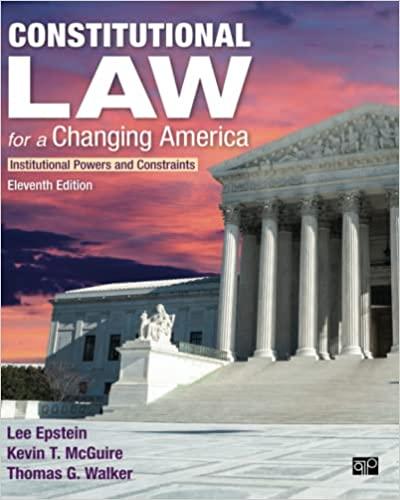Question
Please help with the case question! Thank You Tippee Liability Dirks v. Securities and Exchange Commission 463 U.S. 646 (1983) [A] tippee assumes a fiduciary
Please help with the case question! Thank You
Tippee Liability Dirks v. Securities and Exchange Commission 463 U.S. 646 (1983) [A] tippee assumes a fiduciary duty to the shareholders of a corporation not to trade on material nonpublic information only when the insider has breached his fiduciary duty to the shareholders by disclosing the information to the tippee and the tippee knows or should know that there has been a breach. * * * Whether disclosure is a breach of duty therefore depends in large part on the purpose of the disclosure. This standard was identified by the SEC itself in Cady, Roberts: a purpose of the securities laws was to eliminate "use of inside information for personal advantage." Thus, the test is whether the insider personally will benefit, directly or indirectly, from his disclosure. Absent some personal gain, there has been no breach of duty to stockholders. And absent a breach by the insider, there is no derivative breach. * * * Under the inside-trading and tipping rules set forth above, we find that there was no actionable violation by Dirks. It is undisputed that Dirks himself was a stranger to Equity Funding, with no preexisting fiduciary duty to its shareholders. He took no action, directly, or indirectly, that induced the shareholders or officers of Equity Funding to repose trust or confidence in him. There was no expectation by Dirk's sources that he would keep their information in confidence. Nor did Dirks misappropriate or illegally obtain the information about Equity Funding. Unless the insiders breached their Cady, Roberts duty to shareholders in disclosing the nonpublic information to Dirks, he breached no duty when he passed it on to investors as well as to the Wall Street Journal. * * * It is clear that neither Secrist nor the other Equity Funding employees violated their Cady, Roberts duty to the corporation's shareholders by providing information to Dirks. The tippers received no monetary or personal benefit for revealing Equity Funding's secrets, nor was their purpose to make a gift of valuable information to Dirks. As the facts of this case clearly indicate, the tippers were motivated by a desire to expose the fraud. In the absence of a breach of duty to shareholders by the insiders, there was no derivative breach by Dirks. Dirks therefore could not have been "a participant after the fact in [an] insider's breach of a fiduciary duty." Chiarella, 445 U.S., at 230, n. 12. * * * We conclude that Dirks, in the circumstances of this case, had no duty to abstain from the use of the inside information that he obtained. The judgment of the Court of Appeals therefore is reversed. C A S E Q U E S T I O N S 1. When does a tippee assume a fiduciary duty to shareholders of a corporation? 2. Did Dirks violate any insider trading laws? Why or why not? 3. How does this case refine Rule 10b-5?
Step by Step Solution
There are 3 Steps involved in it
Step: 1

Get Instant Access to Expert-Tailored Solutions
See step-by-step solutions with expert insights and AI powered tools for academic success
Step: 2

Step: 3

Ace Your Homework with AI
Get the answers you need in no time with our AI-driven, step-by-step assistance
Get Started


